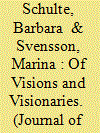|
|
|
Sort Order |
|
|
|
Items / Page
|
|
|
|
|
|
|
| Srl | Item |
| 1 |
ID:
115918


|
|
|
| 2 |
ID:
127639


|
|
|
|
|
| Publication |
2013.
|
| Summary/Abstract |
Political development of independent Kyrgyzstan has been geared at democratization and the best possible form of governance. Under presidents Akaev and Bakiev, the semi-presidential system turned out to be a failure: in the course of time it degenerated into monopoly rule and usurpation of state power. The events of April 2010 opened a new stage in the republic's political development and created conditions for a semi-parliamentary form of governance.
This article analyzes the prospects for a parliamentary system in Kyrgyzstan, its weak and strong points, and its future. The author argues that despite its weak points, semi-parliamentary democracy will make the republic's political system more democratic.
|
|
|
|
|
|
|
|
|
|
|
|
|
|
|
|
| 3 |
ID:
178311


|
|
|
|
|
| Summary/Abstract |
This special issue approaches information and communication technologies (ICT) visions and their realisation/implementation at various levels, among different actors and from various perspectives. Conceptually, we distinguish three different dimensions, even though those overlap in the individual contributions as well as in empirical reality – namely ideational, instrumental, and relational. The different contributions address both visions formulated by the Chinese state and by individual actors such as entrepreneurs. Even though the conditions for the use of ICT in China are deeply affected by state governance, this governance is in no way tantamount to one single government. As this issue’s contributions show, state attempts at building a stable cyber-governance are in need of allies and, depending on the allies’ visions and other, competitive visions, the outcomes of these dynamics are seldom truthful realisations of one original grand masterplan.
|
|
|
|
|
|
|
|
|
|
|
|
|
|
|
|
| 4 |
ID:
112949


|
|
|
|
|
| Publication |
2012.
|
| Summary/Abstract |
As part of a massive rural-to-urban migrant population in post-Mao reform era China, rural male migrants in their early twenties are increasingly entering the sex industry, which offers same-sex sexual services to other men. These young men, known as "money boys," form a new urban subject. From continuous ethnographic research on the male sex industry in China since 2004, the author argues that this new urban subject represents the site of multiple contradictions in China's continual transformations, which are at once authoritarian and neoliberal. The neoliberal reconfiguration, such as development strategies, commercialization of bodies, and liberalization of identities, opens up new social and sexual spaces and nurtures in thema new enterprising and desiring ethics of the self. However, their pursuit of needs, wants, and desires for work, love, and sex remains constricted by authoritarian codes such as the hukou system, antiprostitution measures, and the stratified cosmopolitan tongzhi community. Money boys are new urban subjects, but city outcasts; they are new labor subjects, but illegal dagongzai; they are new queer subjects, but "improper" tongzhi. Using the narratives of three money boys, the author argues that they, though endorsing neoliberal "ways of doing things" to create viable spaces for survival, do not embrace neoliberal political projects that tend to reinforce the hierarchical structure of urban-rural divisions, legal/illegal labor relationships, and illicit/licit desires. This article contributes to studies of migration, prostitution, and homosexuality in China, as well as to an understanding of the relationship between capitalism, state governance, and subjectivity in post-socialist China.
|
|
|
|
|
|
|
|
|
|
|
|
|
|
|
|
|
|
|
|
|